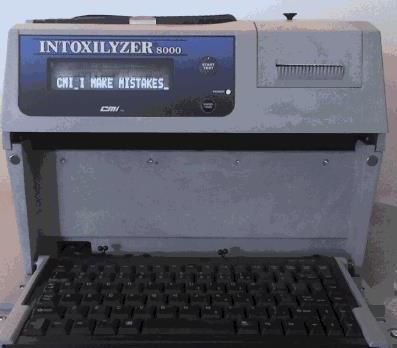
But for a technical legal issue that may only be interesting to an Ohio DUI/OVI lawyer, the case of State v. McMahon would be pretty generic. An officer pulled him over for speeding, noticed the odor of alcohol, administered field sobriety tests, arrested him, gave him a breath test on an Intoxilyzer 8000, and charged him with O.V.I. McMahon filed a motion to suppress the results of the breath test, claiming the Department of Health was required to make rules for obtaining ‘operator access cards’ (to operate the I-8000) and never did. The trial court agreed with McMahon and threw out the breath test.
The history of Ohio regulations regarding breath testing shed light on the significance of this issue. Before the regulations were changed in 2009, Ohio had two approved breath-testing machines; the BAC Datamaster and the Intoxilyzer 5000. The regulations contained requirements for obtaining a ‘permit’ to operate those machines. In 2009, the regulations were changed to add the Intoxilyzer 8000 to the category of approved machines. The regulations for the Intoxiyzer 8000 require an ‘operator access card’ but do not contain requirements for obtaining an access card.
In State v. McMahon, the prosecution appealed the trial court’s ruling to the First District Court Of Appeals. The reasoning of the appellate court was essentially this: (1) the breath test must be conducted by a person with an operator permit; (2) the Department of Health is responsible for issuing operator permits to qualified persons; (3) the qualifications to obtain an operator permit are listed in section 3701-53-07 of the Ohio Administrative Code; and (3) an operator access card is a type of permit. The Court relied on the testimony of Mary Martin, head of the Department of Health’s Alcohol and Drug Testing program, who testified that an operator access card is a type of permit. Consequently, the Court of Appeals reversed the trial court’s ruling, and the breath test is now admissible in McMahon’s case.
The McMahon decision ignores the reality that the regulations repeatedly distinguish between ‘permits’ and ‘access cards’. Section 3701-53-09 is titled “Permits and Operator Access Cards”. That section discusses how to obtain ‘operator permits’ and ‘operator access cards’ in separate paragraphs: one paragraph for obtaining ‘permits’, and a separate paragraph for obtaining ‘access cards’. Another part of that section says permits expire in one year, and operator access cards do not expire. Section 3701-53-08 is titled “Surveys and Proficiency Examinations”. That section has one paragraph for persons with ‘operator permits’ and a separate paragraph for persons with ‘operator access cards’. The rules for surveys and proficiency examinations for ‘permit’ holders are different than the rules for ‘operator access card’ holders. Section 3701-53-07 says (local) senior operators are responsible for maintaining the Datamaster and Intoxilyzer 5000, but the Ohio Department of Health is responsible for maintaining the Intoxilyzer 8000. When it promulgated these rules, the Department of Health made clear distinctions between ‘operator permits’ and ‘operator access cards” and did not say anywhere in the rules that an operator access card is a type of permit.
The Department of Health should have included in the rules the qualifications for obtaining ‘operator access cards’ like it did for ‘operator permits’. The Department of Health could have simply indicated in the rules that the qualifications for ‘operator access cards’ are the same as the qualifications for ‘operator permits’, but it failed to do so. As a result, the Department of Health cannot issue permits for the Intoxilyzer 8000 to qualified persons because there are currently no qualifications.
That conclusion identifies the real problem, and possibly the policy perspective underlying the trial court’s decision: ruling in favor of the defendant in this case would acknowledge that there cannot be an admissible breath test from the Intoxilyzer 8000 until the Department of Health promulgates a new rule establishing qualifications for an operator access card. As the Court of Appeals observed at the beginning of the McMahon decision: “Under the trial court’s analysis, no person could become qualified to operate the Intoxilyzer 8000, and any breath test taken on that machine would be inadmissible in a prosecution under R.C. 4511.19.” Rather than making such a ruling, the Court rescued the Intoxilyzer 8000 for continued use in Ohio DUI/OVI cases.
 Columbus OVI/DUI Attorney Blog
Columbus OVI/DUI Attorney Blog

